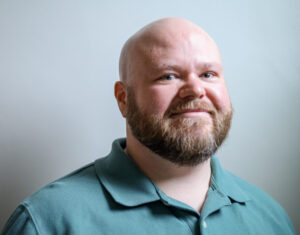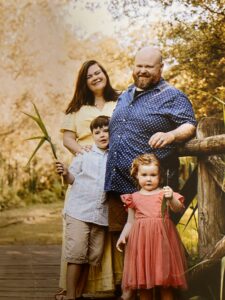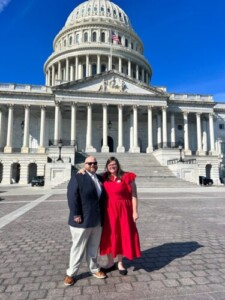
Troy P.
Manager of Value-Based Contracting & Oversight
How long have you worked at Neighborhood? What is your position, and what do you enjoy most about your position?
I’ve worked at Neighborhood for close to five years. My current position is Manager of Value-Based Contracting & Oversight, where I’m responsible for the creation, implementation, and management of value-based contracts outside of the Account Entity program, along with regulatory oversight as it relates to certain contractual requirements.
Did any position or experience prepare you for your current position, and why?
Prior to joining Neighborhood, I worked for the State of Colorado’s Department of Health Care Policy and Financing (Colorado’s State Medicaid Agency), where I managed five behavioral health organizations and worked on delivery system design—my time there directly prepared me for my role at Neighborhood.
Where did you grow up?
I was born and raised in Pascoag, Rhode Island, and now reside in Cranston. I’ve also lived in other parts of Rhode Island, Massachusetts, and Colorado.
After graduating High School, did you start career, family, attend college/technical school, or enter the military?
After graduating high school, I went to CCRI. Let’s just say I needed some time to figure things out and took a two-year break after my first semester at CCRI. During that time, I held a variety of jobs. Then, I took a position at Rhode Island Medical Imaging, where I worked for over five years. I went back to school and earned my bachelor’s degree in history and anthropology at Rhode Island College. Upon graduating, I landed a job in sales at what is now known as “Wayfair.” After two years, I found myself bored and decided to go to law school.
In May 2014, I graduated from Roger Williams University School of Law. My graduation was on a Friday, and by Monday morning, my wife and I were on our way to Denver with an apartment secured, enough money to pay rent for a month, and no jobs. Fortunately, my wife quickly found a full-time job at the Brewer’s Association, which had excellent perks, like free passes to the Great American Beer Festival, among others. In November of 2014, I started at HCPF, which began my career working in Medicaid.
How do you enjoy spending time outside of work?
When I’m not at work, I can be found with my family, advocating about healthcare-related issues, roaming the wilderness, or, among other things, seeking out live music. I’ve been married to my wife Ashley for over 12 years (together for 18 years). We have two children, Elliott (6) and Aspen (4). In between all the kids’ activities, we spend our time traveling as much as possible, whether it’s a weekend in Portsmouth, New Hampshire, or a week in Florida or Maine. In the summer, we spend time camping, going to music festivals, and finding other fun activities.

I spend a large portion of my personal time devoted to advocacy around healthcare-related issues, particularly pediatric cancer. Currently, I’m involved with the Leukemia & Lymphoma Society (LLS) and the National Marrow Donor Program (Be the Match) as a volunteer advocate.
While my advocacy will clearly benefit others, I’m doing this work because of my daughter, Aspen. Just after her first birthday, Aspen was diagnosed with a rare and aggressive form of Acute Myeloid Leukemia, known as AML-RAM, with a GLIS-2 fusion, a disease often associated with poor outcomes, i.e., less than a 20% five-year survival rate and known to be resistant to traditional treatments. Aspen’s only chance at survival was a bone marrow transplant from an unrelated donor, as neither Elliott, Ashley, nor I were adequate matches. Aspen went through six months of inpatient experimental chemotherapy and a bone marrow transplant, reaching remission in June of 2021.
While Aspen was hospitalized, Ashley and I provided a voice to the voiceless, e.g., Aspen and other families who couldn’t muster the strength to speak. We advocated for all kinds of things, ranging from COVID vaccines to snacks. The day after Aspen’s transplant really stands out to me. On that day, I sat in a small closet at Boston Children’s Hospital on a Zoom call with executives from Sutro Biopharma pleading with them to provide compassionate use for a drug they were developing. At the time, Sutro’s drug provided the only path of recourse should Aspen relapse. Shortly after that call, Sutro agreed to compassionate use, and the first child received this investigational therapy.
On January 13, 2022, following a routine biopsy, we found out that Aspen relapsed. Knowing that the gold standard for pediatric AML has a 0% effective rate for Aspen’s disease, we pursued compassionate use from Sutro. In February of 2022, Aspen became the ninth child to receive the drug. While Aspen is currently in remission and in pre-school, the fight is not over, as she remains at high risk for relapse, secondary cancers, and a lifetime of medical complications stemming from the harsh therapies she endured.
Can you share something about yourself that others might find interesting?
I spend a large portion of my personal time devoted to advocacy around healthcare-related issues, particularly pediatric cancer. Currently, I’m involved with the Leukemia & Lymphoma Society (LLS) and the National Marrow Donor Program (Be the Match) as a volunteer advocate.
In October of last year, we had the opportunity to spend time in Washington, D.C., at LLS’ Dare to Dream Summit, which focused on leukemia research, living with pediatric leukemia, and advocacy. On the last day of the Summit, we went to Capitol Hill to meet with our federal delegation about a variety of issues related to pediatric cancer. Specifically, we discussed the Accelerating Kids’ Access to Care Act (AKACA), which alleviates some issues around Provider Screening for Medicaid members aged 21 and under who need care outside their home state. Provider screening can be a barrier to care for some Medicaid members, particularly for kids battling cancer whose only chance of survival is oftentimes a clinical trial not available in their home state.

The delegation heard us loud and clear as we explained our own story: Medicaid members must be able to avail themselves of the same level of care as any other similarly situated person, regardless of their insurance. In fact, Sheldon Whitehouse agreed to co-sponsor the AKACA right there on the spot, and others have subsequently agreed to support the bill.
In February 2024, Ashley and I returned to Capitol Hill with Be the Match to meet with our federal delegation to discuss issues around bone marrow donation as it relates to job protection, income, and other issues.